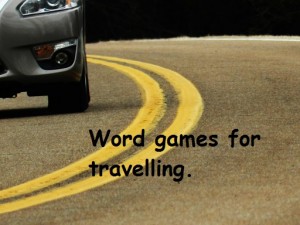There’s so much to do to prepare for Christmas. Food to buy, presents to buy and wrap, cards to write, and, in some houses, including ours, lots of travel plans to make ready to visit all the family over the festive season. We have just spent a weekend in Yorkshire, and we’ll be in Scotland, Wiltshire and Cambridgeshire over the next few weeks, which means an awful lot of time spent at airports (we fly to Scotland) and in the car. Part of the planning for that always involves trying to work out how to entertain my daughter while we’re travelling!
Like every other family I’m sure, this can be one of the most challenging parts of the travelling, but actually, it’s also a great opportunity for conversation. Whether your children have language problems or not, word games in the car will keep the family entertained for at least a little bit of the journey and the children may even learn something too.
So today, here are my top 10 word games to play while travelling. Many of them will be more appropriate for school age children rather than preschoolers, but I’ve tried to include some ideas of how to adapt each one to different levels as far as possible.
1. I Spy. This one has to go first on the list as I’m sure it’s the first one most people think of! The traditional version, of course, involves spelling or phonemes (I spy something beginning with s etc) but you can play other versions eg colours and other categories (eg I spy something green or I spy something soft).
2. Invent a story. Make up a story together. Each person in the car takes a turn to add a little bit to the story. Great for turn-taking, listening to each other and developing imagination. With younger or less verbal children, you could try telling a story and leaving gaps for them to fill in (eg suddenly they saw a…) so that they can influence how the story goes.
3. 20 questions. Choose a category (eg famous people, things in the car, animals etc). One person thinks of something in that category. The others in the car take turns to ask questions to work out what it is. This one is great for older children (or adults) and helps with inferencing and deduction, asking questions and vocabulary.
4. I went to market. Another one that will be very familiar to most people. The first person says I went to market and I bought… The next person repeats it and adds to the list. For example, if the first person says I went shopping and I bought an apple, the next could say, I went shopping and bought an apple and some milk. You could change this game by changing the starting phrase (eg on our journey we saw). Make it harder by using consecutive letters of the alphabet. For younger children you could just ask them to add an item to to list and not repeat what has gone before.
5. Bingo. This is great for little children – who can be first to see a tree? We used to play this with my daughter when she was just 2. You can make it harder by asking for more difficult things to spot or by giving a list of things. (eg who can be first to spot a green lorry, a wooden fence and a shop).
6. Draw a picture. One that’s better for airports or train stations as it requires a pen and paper. Each person has a piece of paper. One person draws a picture and then tries to describe it for other people to draw the same thing. Great for listening and following instructions as well as putting in all the relevant information.
7. Simon says. This can be a little limited when sitting in car seats, but with imagination, there are a variety of things you can do – eg clap, shout, touch different body parts, close your eyes, stick your tongue out etc. Health warning: the driver should probably be exempt from this game – especially closing their eyes!
8. Listen for a word. An adult reads or tells a story and asks the children to listen for one particular word and do a certain action. For example, every time I say Father Christmas, say ho ho ho. This is good for listening and following instructions. Make it harder by asking them to listen for several different words.
9. Planning your trip. If you’re going somewhere your child knows well, see if they can remember things they might see and do. If you’re going somewhere unfamiliar, they can guess. You might want to do this in categories – eg things we might do, things we might eat, people we might see etc.
10. Just a minute. This is another one for older children. Take turns to choose a topic, either for yourself or for someone else. (Parents may want to pick the topics so they are suitable for each child, especially if you have children of quite varied ages. Each person has one minute to talk about their topic without deviating from the subject. If they manage it, they win a point. If the others think that they strayed too far from the topic, they don’t. This is great for topic maintenance, and working out what is the important information to give about a topic.
Does anyone have any other favourites to share?







Leave a Reply